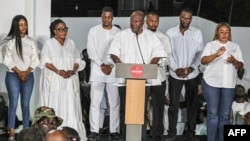Ghana's Electoral Commission declared former president and opposition leader John Mahama the president-elect Monday following Saturday’s general elections. His return to power sparked mixed reactions, with some celebrating a fresh start and others questioning his ability to address Ghana’s economic challenges.
Supporters of Ghana’s opposition party, the National Democratic Congress (NDC), took to the streets of Accra chanting songs of victory to celebrate Mahama’s reelection.
For Jeremiah Maclean, a staunch NDC supporter, his win was nothing short of monumental.
“This is an overwhelming victory, and we are really excited. The good people of Ghana have shown the exit way to the NPP for mismanaging the economy,” he said, referring to the New Patriotic Party of defeated President Nana Akufo-Addo.
However, for Alexander Bonsu, a disappointed voter and supporter of the New Patriotic NPP, Mahama's return to power raises serious concerns.
“He was once the president of Ghana, and we saw what he did. We saw how bad the economy was, we saw how he canceled the nursing trainees’ allowances,” he said.
For Bonsu, Mahama’s track record leaves little hope for the future.
“Someone who has cost me before, I will find it very difficult to give him another chance,” he added.
Yet, NDC supporter Maclean remains optimistic.
“They have voted for a visionary leader, they have voted for a man that will change the fortunes of this country, they have voted for a man that will reset this country,” he said.
Ghana’s Electoral Commission tally gave Mahama 56% of the vote. Analysts attribute his win to widespread discontent with the ruling government’s handling of the economy.
Dr. Kwame Asah-Asante, a political analyst at the University of Ghana, believes the election results reflect deep-seated frustrations.
“It is a manifestation of the fact that there was a lot of mistrust that people had, the hopelessness with which people viewed the political and economic system that has existed so far,” he said.
Mahama’s presidency from 2012 to 2017 left a mixed legacy. According to analyst Jonathan Asante Okyere, while Mahama was credited for infrastructure projects and inclusivity, he struggled with Ghana’s energy crisis.
“We had issues of power fluctuation, power instability but he was able to solve it before he left. Unfortunately, the ordinary citizen did not see that as a kind gesture, so they had to punish him at the polls.” he said.
As Mahama prepares to take office, Asante Okyere cautions that the road ahead will be steep, given the nation’s economic challenges.
“The people have a high expectation of his promises,” he said. “That for me will be the challenge that he is likely to face. If you look at the mess that we find ourselves in, especially as we are not able to service our debts, it feels like there are even deeper cracks than what meets the eye.”
For many Ghanaians, the hope is that Mahama’s administration will stabilize the economy and create opportunities in the face of rising inflation and unemployment. Analysts have called for him to cut government expenditures and manage the country’s debt.




